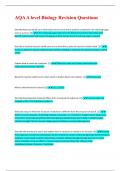Classtie
On this page, you find all documents, package deals, and flashcards offered by seller Classtie.
- 872
- 0
- 24
Community
- Followers
- Following
896 items

South America Geography ALREADY PASSED
Altiplano - ANS a broad, high plateau that lies between the ridges of the Andes South America archipelago - ANS A group or chain of islands canopy - ANS Dense covering formed by the leafy tops of tall rain forest trees Pampas - ANS A grasslands region in Argentina and Uruguay Patagonia - ANS A large platuea in southern Chile and Argentina plateau - ANS A large area of flat land elevated high above sea level rain forest - ANS Dense forest that receives high amounts of rain each year savann...
- Exam (elaborations)
- • 2 pages •
Altiplano - ANS a broad, high plateau that lies between the ridges of the Andes South America archipelago - ANS A group or chain of islands canopy - ANS Dense covering formed by the leafy tops of tall rain forest trees Pampas - ANS A grasslands region in Argentina and Uruguay Patagonia - ANS A large platuea in southern Chile and Argentina plateau - ANS A large area of flat land elevated high above sea level rain forest - ANS Dense forest that receives high amounts of rain each year savann...

Spanish geography A LEVEL
Costa Rica Many consider Costa Rica a very special place. Its residents, Ticos, are polite, peaceful, and extremely friendly. Costa Rica has no army and prides itself on having more teachers than polive officers. Costa Rica is a county of sun-drenched beaches in the Pacific, tropical jungles along the carribian coast , cosmopolitan cities such as San José, and high mountains on the Central Valley. Costa Rica is a tourist paradise as well as home to many expatriates. - ANS Many consider Cost...
- Exam (elaborations)
- • 6 pages •
Costa Rica Many consider Costa Rica a very special place. Its residents, Ticos, are polite, peaceful, and extremely friendly. Costa Rica has no army and prides itself on having more teachers than polive officers. Costa Rica is a county of sun-drenched beaches in the Pacific, tropical jungles along the carribian coast , cosmopolitan cities such as San José, and high mountains on the Central Valley. Costa Rica is a tourist paradise as well as home to many expatriates. - ANS Many consider Cost...

the United States: The Midwest and the West World Geography
A long, thin strip of land-locked land attached to a larger area is known as a peninsula. - ANS false Rainfall on the leeward side of the Rockies is reduced. Such an area is known as a _____. - ANS rain shadow Match the letter with the name of the place it represents on the map. - ANS Lake Superior - ANS A Missouri River - ANS B Ozark Mountains - ANS C Badlands - ANS D Great Plains - ANS E Sierra Nevadas - ANS F Great Salt Lake - ANS G Grand Canyon - ANS H
- Exam (elaborations)
- • 3 pages •
A long, thin strip of land-locked land attached to a larger area is known as a peninsula. - ANS false Rainfall on the leeward side of the Rockies is reduced. Such an area is known as a _____. - ANS rain shadow Match the letter with the name of the place it represents on the map. - ANS Lake Superior - ANS A Missouri River - ANS B Ozark Mountains - ANS C Badlands - ANS D Great Plains - ANS E Sierra Nevadas - ANS F Great Salt Lake - ANS G Grand Canyon - ANS H

United States Geography
Piedmont - ANS The area that lies between the Atlantic plain and the Appalachians Appalachians - ANS The oldest mountain range on the North American continent Mt. McKinley - ANS The highest mountain in the United States Rockies - ANS Location of the continental divide where waters flow in different directions Fall line - ANS The location of rapids and waterfalls located where the higher land of the Piedmont drops into the Atlantic coastal plain. Missouri - ANS The longest river in the Unit...
- Exam (elaborations)
- • 3 pages •
Piedmont - ANS The area that lies between the Atlantic plain and the Appalachians Appalachians - ANS The oldest mountain range on the North American continent Mt. McKinley - ANS The highest mountain in the United States Rockies - ANS Location of the continental divide where waters flow in different directions Fall line - ANS The location of rapids and waterfalls located where the higher land of the Piedmont drops into the Atlantic coastal plain. Missouri - ANS The longest river in the Unit...

7. AQA GCSE Biology: Ecology
Ecosystem - The interaction of a community of living organisms with the non-living parts of their environment What is a community made up of? - The populations of different species or organisms that are all interdependent in a habitat Habitat - The environment in which an organism lives Population - The total number of organisms of the same species living in the same geographical area Interdependence - The way in which each species within a community depends on other species for food, sh...
- Exam (elaborations)
- • 15 pages •
Ecosystem - The interaction of a community of living organisms with the non-living parts of their environment What is a community made up of? - The populations of different species or organisms that are all interdependent in a habitat Habitat - The environment in which an organism lives Population - The total number of organisms of the same species living in the same geographical area Interdependence - The way in which each species within a community depends on other species for food, sh...

All of AQA GCSE Biology (9-1) - Paper 1
What are the two types of microscopes? - Light Microscope Electron Microscope What is the magnifying power of a light microscope? - x 2,000 What is the magnifying power of an electron microscope? - x 2,000,000 What is the resolving power? - The ability to distinguish between two separate points What is the resolving power of light microscopes? - 200 nm What is the resolving power of electron microscopes? - 0.2 nm What are the advantages of light microscopes? - 1. living samples 2. can vi...
- Exam (elaborations)
- • 35 pages •
What are the two types of microscopes? - Light Microscope Electron Microscope What is the magnifying power of a light microscope? - x 2,000 What is the magnifying power of an electron microscope? - x 2,000,000 What is the resolving power? - The ability to distinguish between two separate points What is the resolving power of light microscopes? - 200 nm What is the resolving power of electron microscopes? - 0.2 nm What are the advantages of light microscopes? - 1. living samples 2. can vi...

AQA-GCSE Biology Topic 6 exams already passed
What are chromosomes? - They are really long molecules of DNA What does DNA stand for - DeoxyribonNucleicAcid. It is a complex chemical in a thread-like chain. It contains coded information and genetic information Where is DNA found - It is found in the nucleus of animal and plant cells in long structures called chromosomes. Chromosomes normally come in pairs What is DNA structure called - It is a polymer. It is made up of two strands coiled together in the shape of a double helix. What i...
- Exam (elaborations)
- • 13 pages •
What are chromosomes? - They are really long molecules of DNA What does DNA stand for - DeoxyribonNucleicAcid. It is a complex chemical in a thread-like chain. It contains coded information and genetic information Where is DNA found - It is found in the nucleus of animal and plant cells in long structures called chromosomes. Chromosomes normally come in pairs What is DNA structure called - It is a polymer. It is made up of two strands coiled together in the shape of a double helix. What i...

AQA A level Biology Revision Questions
Describe how you would use a biochemical test to show that a solution contained a non-reducing sugar, such as sucrose. [3] - ,first reducing sugars test; boil with dilute HCl acid then Neutralise with NaHCǑ, add benedict and heat to 95 degrees C brick red ppt forms if reducing sugar is present Describe a chemical test you could carry out to show that a piece of coconut contains lipids. [3] - (Crush in) ethanol / alcohol; Add (to) water (Order of adding is critical for this point); Emulsion...
- Exam (elaborations)
- • 82 pages •
Describe how you would use a biochemical test to show that a solution contained a non-reducing sugar, such as sucrose. [3] - ,first reducing sugars test; boil with dilute HCl acid then Neutralise with NaHCǑ, add benedict and heat to 95 degrees C brick red ppt forms if reducing sugar is present Describe a chemical test you could carry out to show that a piece of coconut contains lipids. [3] - (Crush in) ethanol / alcohol; Add (to) water (Order of adding is critical for this point); Emulsion...

AQA A-level Biology paper 1
large molecules often contain carbon. why? - they can readily form bonds with other carbon atoms. this forms a 'backbone'. other atoms can then attach. describe benedicts test for reducing sugars - add equal volumes of the sugar sample and benedicts reagent. heat the mixture in a water bath for 5 minutes. brick red precipitate will form. what is a reducing sugar? - a sugar that can reduce (give electrons to) another chemical. describe the benedicts test for non reducing sugars - with fo...
- Exam (elaborations)
- • 23 pages •
large molecules often contain carbon. why? - they can readily form bonds with other carbon atoms. this forms a 'backbone'. other atoms can then attach. describe benedicts test for reducing sugars - add equal volumes of the sugar sample and benedicts reagent. heat the mixture in a water bath for 5 minutes. brick red precipitate will form. what is a reducing sugar? - a sugar that can reduce (give electrons to) another chemical. describe the benedicts test for non reducing sugars - with fo...

AQA biology a-level paper 2
describe and explain the steps in the light dependent reaction of photosynthesis - 1. photoionisation: light reaches chlorophyll in PSII, which is absorbed by an electron, which becomes excited and moves to a higher energy level. 2. the electron passes to a carrier protein in the thylakoid membrane, and is passed down a series of carrier molecules called an electron transfer chain. 3. as the electron moves down, energy is lost from the electron and is released as ATP. 4. the loss of electr...
- Exam (elaborations)
- • 20 pages •
describe and explain the steps in the light dependent reaction of photosynthesis - 1. photoionisation: light reaches chlorophyll in PSII, which is absorbed by an electron, which becomes excited and moves to a higher energy level. 2. the electron passes to a carrier protein in the thylakoid membrane, and is passed down a series of carrier molecules called an electron transfer chain. 3. as the electron moves down, energy is lost from the electron and is released as ATP. 4. the loss of electr...
